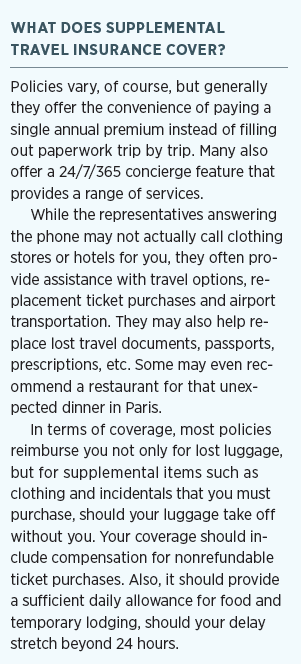Travel mishaps such as delayed flights and lost luggage may not qualify as your worst nightmare, but having a serious health issue while visiting an emerging nation might. You may have the need and desire to travel frequently, and that frequency ups the odds of experiencing some unpleasantness while traveling. You may also like to visit, or need to go to, less developed countries where the likelihood of something going wrong is greater.
The purpose here is to enlighten, not to frighten, but all insurance assumes that at some point something can go wrong, and intelligent individuals prepare for that possibility. You may already receive travel insurance through your credit card or your business, but we suggest you check the level and depth of coverage to make certain it is sufficient.
For example, if you, a member of your family or a caretaker sustains an injury—a broken ankle, say—or requires a time-sensitive surgery such as an appendectomy, you may need emergency evacuation and transportation to a more populous area or even to another country. To get a sense of what that might cost, one insurance carrier with which we work offers coverage of up to $250,000 just for emergency medical transportation.
But supplemental travel insurance is not only about preparing for nightmare scenarios. It also eases and covers what we might call the “bad dreams” of travel. Imagine you are in a major European city, ready to return home after an arduous round of meetings. You get to the airport, check your baggage, go through security and find out a half hour later that because of a snowstorm in New York, your flight has been canceled. Now what?
Supplemental travel insurance is not just about preparing for nightmare scenarios. It also eases and covers what we might call the ‘bad dreams’ of travel.
You cannot get your luggage back because it has already passed through security. You have your smartphone, your laptop and the clothes on your back, and that is it. Now begins a round of calls: to the hotel you just checked out of, to the limo service to take you back into town, to a clothing store for a change of clothes, etc. Who covers all this added expense? You may be nodding your head as you read this. If you are, we suggest you read the sidebar to get a sense of how supplemental travel insurance can at least lower your stress level.
Insurance services provided through NFP Property & Casualty Insurance, Inc., a subsidiary of NFP Corp. Doing business in California as NFP Property & Casualty Insurance Services, Inc. (Calif. License # 0F15715).
This article was originally published in the February–April 2017 issue of Worth.

















